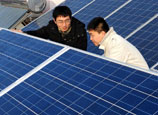
Tech edge pays off for entrepreneur
"It's hard to fly in the sky, but it's even more tough to dive deep into the sea," says an exasperated Lin Xiufen after spending eight years unlocking the mysteries of the oceans.
Despite the odds stacked against her, the general manager of Xiamen Blue Bay Science & Technology Co Ltd, a marine biomedicine firm in Fujian province, remains confident on the prospects for the blue economy in China and the potential rewards for those who are willing to brave the currents.
Lin's company Blue Bay is one of the few in China that makes glucosamine capsules, a non-prescription dietary supplement used for treating osteoarthritis symptoms and to help maintain healthy joint cartilage. The capsules are made from high purity sodium (potassium) free glucosamine sulfate harvested from the shells of shellfish like prawn and crab.
Lin says that her company can produce up to 20 tons of pure glucosamine sulfate every year with purity levels in excess of 90 percent compared with the global norms of 80 percent. "It is a high-yield product as a ton of glucosamine can command prices of up to 10 million yuan ($1.6 million; 1.2 million euros)."
Though the returns are high, Lin, in her 40s, says that the initial years were harrowing.
To begin with, high-purity glucosamine was a new research product developed by the Third Institute of Oceanography, under the State Oceanic Administration in Xiamen. Like many other new high-tech products, TIO's glucosamine did not have backers initially and there was an acute funding crunch for commercializing the product.
Eyeing the promising future for the product, Lin set up Blue Bay in 2005 after leaving a high-paid director-level job at a state-owned financial firm. She says that to generate the seed capital for the venture, she had to sell most of the property she owned. "To date, I have invested nearly 60 million yuan in the project."

















 China's social trust index declined further last year, according to the Annual Report on Social Mentality of China 2012
China's social trust index declined further last year, according to the Annual Report on Social Mentality of China 2012


![]()
